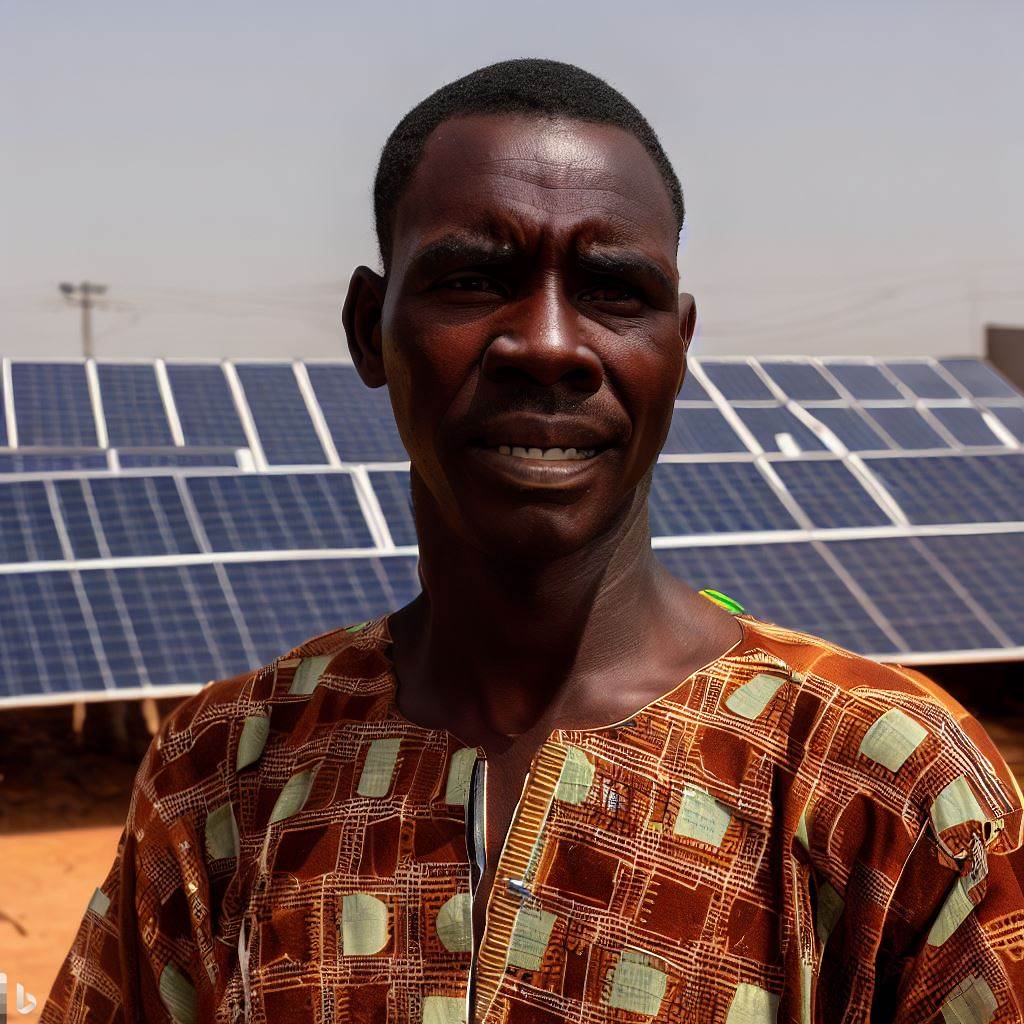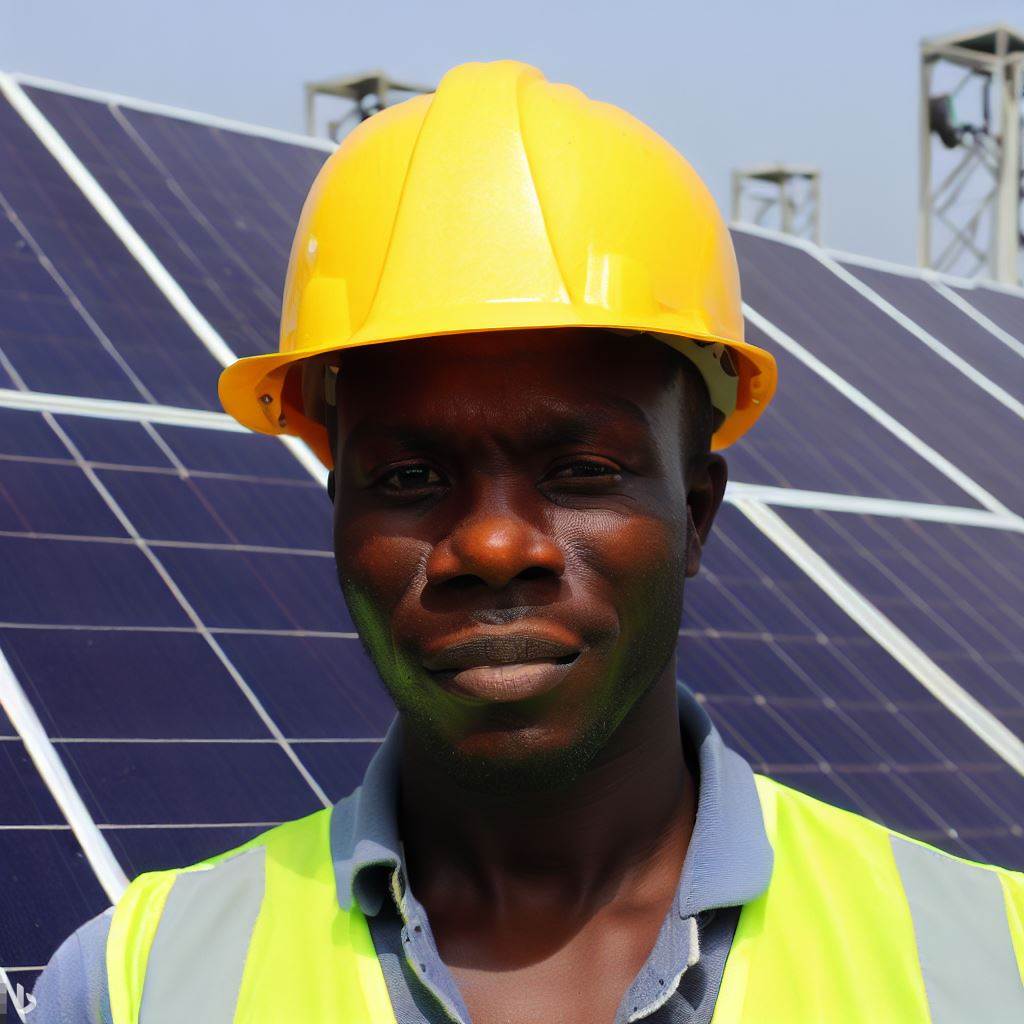Introduction
Let’s talk about rural solar installation in Nigeria.
Solar energy is of great importance in Nigeria, providing a sustainable and reliable power source.
However, many rural areas in the country still lack access to electricity.
Current Scenario of Rural Areas in Nigeria
According to statistics, a large percentage of rural areas in Nigeria lack access to electricity.
The lack of electricity in rural areas poses numerous challenges for the communities living there.
A. Statistics on the lack of electricity in rural areas
- In Nigeria, approximately 60% of the population lives in rural areas, where access to electricity is limited.
- Out of this rural population, only about 30% have access to reliable electricity services.
- The majority of rural communities rely on unsustainable sources of energy such as kerosene lamps, candles, and diesel generators.
B. Challenges faced by rural communities without access to electricity
1. Education and Information
- Lack of electricity hampers access to modern educational resources, hindering the learning capabilities of students.
- Students cannot study after dark, leading to limited study hours and decreased academic performance.
- Access to the internet and information communication technologies (ICTs) is severely limited, hindering economic development.
2. Health and Medical Services
- Without electricity, healthcare facilities struggle to provide proper medical care and treatment.
- Vaccines, medicines, and equipment requiring refrigeration cannot be stored properly, compromising healthcare delivery.
- Emergency services such as ambulance transportation and communication become challenging without electricity.
3. Socio-economic Development
- Limited access to electricity restricts socio-economic development in rural areas.
- Lack of power cuts off opportunities for small-scale businesses to thrive, reducing income and job opportunities.
- Rural electrification plays a crucial role in improving the living standards and overall well-being of rural communities.
4. Safety and Security
- The absence of electricity in rural areas increases vulnerability to criminal activities and threats.
- Poorly lit streets and homes make it difficult for residents to move around safely during the night.
- Lack of electricity also poses a risk to the physical and mental well-being of individuals, especially women and children.
In essence, rural areas in Nigeria face significant challenges due to the lack of electricity.
The statistics highlight the large percentage of rural communities without access to reliable energy services.
These challenges span across various sectors, including education, healthcare, socio-economic development, and safety.
Therefore, urgent efforts are needed to address rural electrification in Nigeria, as it is vital for the overall development and well-being of the country’s rural population.
Read: Cocktail Culture in Nigeria: A Bartender’s View
Solar Installation Initiatives in Nigeria
The adoption of solar energy in Nigeria has been on the rise in recent years, thanks to the efforts of both the government and non-governmental organizations (NGOs).
These initiatives have played a crucial role in promoting the installation of solar panels in rural areas, where access to electricity is limited.
In this section, we will explore the governmental policies and incentives, as well as the efforts made by NGOs, that have contributed to the growth of solar installation in Nigeria.
A. Governmental policies and incentives promoting solar energy
- Feed-in Tariff (FiT) Program: The Nigerian government introduced the FiT program to incentivize the adoption of solar energy.
This program guarantees fixed payments to solar power generators for the electricity they produce and feed into the grid. It encourages private investors and attracts foreign direct investment in solar projects. - Tax-free importation of solar panels: To reduce the cost of solar installation, the Nigerian government has exempted solar panels from import duties and value-added tax (VAT).
This incentivizes the purchase and importation of solar panels, making them more affordable for individuals and businesses. - Rural Electrification Agency (REA): The REA has been instrumental in promoting solar installation in rural areas of Nigeria.
It implements the Energizing Economies Initiative, which aims to provide reliable electricity to markets and trading clusters in rural communities through the installation of solar mini-grids and rooftop solar systems.
B. Non-governmental organizations and their efforts in rural solar installation
- Light Up Nigeria: This NGO focuses on solar electrification projects in rural and underserved communities.
They collaborate with local communities to provide solar-powered lighting systems and train individuals in solar maintenance and entrepreneurship. - Rural Electrification Fund (REF): Created by the Sustainable Energy Fund for Africa and managed by the African Development Bank, the REF supports sustainable and renewable energy projects, including solar installations, in rural areas of Nigeria. It offers grant funding and technical assistance to eligible projects.
- Solar Sister: This NGO empowers women entrepreneurs to build sustainable solar businesses.
They provide training, support, and access to affordable solar products, enabling women to become clean energy advocates in their communities. Solar Sister plays a significant role in increasing solar adoption and awareness among rural populations. - Renewable Energy Association of Nigeria (REAN): REAN is an industry association representing renewable energy companies in Nigeria.
They work towards creating an enabling environment for renewable energy, including solar, through advocacy, public-private partnerships, and capacity building.
REAN acts as a platform for collaboration and knowledge sharing among stakeholders in the renewable energy sector.
The combined efforts of governmental policies and incentives, as well as the contributions of NGOs, have created significant opportunities for solar installation in rural Nigeria.
These initiatives have not only improved access to clean and reliable electricity but also generated employment and fostered sustainable economic development.
As solar energy continues to gain momentum, it is expected to play a pivotal role in Nigeria’s energy transition and empower rural communities to thrive.
Read: Solar PV Installer Certification in Nigeria

Opportunities for Rural Solar Installation in Nigeria
In Nigeria, there are several opportunities for the installation of solar power systems in rural areas.
A. Abundance of sunlight in the region
Nigeria is located in the equatorial region and receives a significant amount of sunlight throughout the year.
This abundance of sunlight makes solar power a viable and reliable source of energy for rural communities.
B. Potential for job creation in the renewable energy sector
The expansion of solar power in rural Nigeria presents an excellent opportunity for job creation in the renewable energy sector.
Installing, maintaining, and servicing solar power systems requires skilled workers and technicians, providing employment opportunities for the local population.
C. Reduction in greenhouse gas emissions and environmental benefits
Solar power is a clean and renewable source of energy that produces zero greenhouse gas emissions during operation.
By encouraging the installation of solar power systems in rural areas, Nigeria can reduce its reliance on fossil fuels and contribute to global efforts to combat climate change.
Additionally, solar power systems do not produce noise pollution or emit harmful pollutants, leading to improved air quality and better living conditions for rural communities.
Potential Opportunities
- Access to reliable and sustainable electricity in rural areas, improving quality of life
- Reduction in the use of traditional biomass fuels, leading to improved health outcomes
- Increased productivity in agriculture, as farmers can power irrigation systems and processing equipment
- Enhanced access to education and digital resources through the availability of electricity
- Support for small businesses and entrepreneurship through the provision of electricity
- Strengthening of local economies by attracting investment in the renewable energy sector
- Promotion of sustainable development and energy diversification in Nigeria
- Opportunities for technology transfer, knowledge sharing, and capacity building
The opportunities listed above demonstrate the multifaceted benefits of rural solar installation in Nigeria.
By tapping into the region’s abundant sunlight, Nigeria can unlock economic, social, and environmental advantages.
It is imperative for the government, private sector, and international organizations to collaborate and invest in rural solar projects to harness these opportunities and drive sustainable development.
Solar energy has proven to be a transformative solution for electricity access in rural communities worldwide.
The success stories of other countries, such as India and Bangladesh, provide valuable lessons and inspiration for Nigeria’s rural electrification efforts.
With careful planning, favorable policies, and strategic partnerships, Nigeria can accelerate the adoption of solar power systems in its rural areas and pave the way for a brighter and more sustainable future.
Undoubtedly, the opportunities for rural solar installation in Nigeria are not only limited to the benefits outlined above.
The potential impact is vast and varied, ranging from improved healthcare to increased economic activities.
It is imperative for stakeholders to seize these opportunities and prioritize the expansion of solar power in Nigeria’s rural areas to achieve a more inclusive and sustainable energy landscape.
Read: The Role of Solar PV Installers in Nigeria’s Grid
Benefits of Solar Energy for Rural Communities
Solar energy has the potential to bring numerous benefits to rural communities in Nigeria.
Below are some of the key advantages:
A. Improved access to electricity for lighting, communication, education, and healthcare
- Solar installations can provide reliable and sustainable power sources, allowing rural communities to have access to electricity for essential needs.
- Electricity can improve lighting conditions in households, enabling children to study in the evenings, and promoting overall safety and security.
- Access to electricity also facilitates communication and connectivity, empowering rural communities to stay connected with the outside world.
- Education and healthcare services can greatly benefit from solar electricity, enabling better learning environments and improved medical facilities.
B. Economic empowerment for rural households and local businesses
- Rural households can generate income by becoming solar energy providers, contributing to their economic empowerment.
- By adopting solar technologies and selling surplus energy back to the grid, households can increase their income and reduce dependence on expensive fossil fuels.
- Local businesses can flourish by utilizing solar power, as it offers a cost-effective and sustainable energy solution, leading to reduced operational costs.
- Entrepreneurs can also capitalize on the solar energy sector by establishing small-scale solar businesses, creating job opportunities within rural communities.
C. Increased agricultural productivity through solar-powered irrigation systems
- Solar-powered irrigation systems can revolutionize farming practices in rural areas by providing a consistent and reliable source of water.
- Rural farmers can utilize solar energy to power irrigation pumps, reducing manual labor and boosting agricultural productivity.
- The ability to irrigate crops effectively can lead to increased yields, enabling farmers to achieve higher profits and contribute to food security in the region.
- Solar energy can also address climate change challenges by promoting sustainable farming techniques and reducing dependence on rain-fed agriculture.
Overall, solar energy has the potential to bring significant improvements to the lives of rural communities in Nigeria.
It offers access to electricity, economic empowerment, and increased agricultural productivity.
By embracing solar energy solutions, rural communities can unlock new opportunities and pave the way for a sustainable and prosperous future.
Read: Nigeria’s Solar PV Industry: A Growth Outlook
Innovative approaches to rural solar installation
Rural areas in Nigeria often lack access to electricity, which hinders their development and quality of life.
However, there are innovative approaches to solar installation that can help address this issue.
Two such approaches are mini-grid systems and pay-as-you-go solar systems.
A. Mini-grid systems for powering entire rural communities
Mini-grid systems are an effective solution for powering entire rural communities.
These systems consist of a central solar power plant that generates electricity and distributes it to nearby households and businesses.
By interconnecting these households and businesses, mini-grids enable them to access reliable electricity without the need for a centralized power grid.
One of the main advantages of mini-grid systems is their scalability. They can be implemented in a phased manner, starting with a small number of households and expanding as needed.
This allows for cost-effective deployment of solar energy infrastructure, making it feasible for even the most remote and underserved areas.
B. Pay-as-you-go solar systems for affordability and scalability
Another innovative approach to rural solar installation is the use of pay-as-you-go solar systems.
These systems allow individuals to access solar energy without the upfront cost of purchasing solar panels and equipment.
Instead, users pay for the energy they consume on a pay-as-you-go basis, similar to how they would pay for a mobile phone plan.
Pay-as-you-go solar systems offer several benefits. Firstly, they increase affordability by eliminating the need for a large upfront investment.
This makes solar energy accessible to low-income households, enabling them to improve their standard of living.
Additionally, the scalability of these systems enables users to start with a small solar installation and gradually expand it over time.
Furthermore, pay-as-you-go solar systems promote sustainable energy usage. Since users pay for the energy they consume, they have an incentive to use it efficiently.
This encourages energy conservation, reducing waste and promoting environmental sustainability.
Implementing these innovative approaches to rural solar installation requires collaboration between government entities, private sector companies, and local communities.
Governments can provide policy support and create an enabling environment for the deployment of mini-grid and pay-as-you-go solar systems.
Private sector companies can invest in the necessary infrastructure and technology, while local communities can actively participate in the planning and implementation of these projects.
In short, innovative approaches such as mini-grid systems and pay-as-you-go solar systems offer tremendous opportunities for rural solar installation in Nigeria.
These approaches provide affordable, scalable, and sustainable solutions to address the lack of access to electricity in rural areas.
By leveraging these technologies and fostering collaboration, Nigeria can significantly improve the lives of its rural population and accelerate its transition towards a greener and more sustainable future.
Overcoming Challenges in Rural Solar Installation
When it comes to rural solar installation in Nigeria, there are several challenges that need to be overcome in order to ensure successful implementation.
These challenges include:
A. Financing options and access to capital for solar projects
- Lack of financial resources and access to capital in rural areas can hinder the installation of solar projects.
- Investment in rural solar installations is often seen as high risk, making it difficult to attract financing.
- Government and NGOs should provide financial support and incentives to promote rural solar projects.
- Microfinance institutions can play a key role in providing loans to rural communities for solar installations.
- Encouraging partnerships and collaborations between private investors and solar companies can help overcome financial barriers.
B. Technical and operational barriers in remote areas
- Remote rural areas often lack basic infrastructure, such as roads and reliable transportation, which can make solar installation challenging.
- Ensuring proper site assessment and feasibility studies are conducted to address technical challenges in remote locations.
- Training local technicians and installers on solar technology and maintenance can help overcome operational barriers.
- Developing innovative and adaptable solar solutions suitable for remote areas is crucial.
- Establishing reliable communication channels and remote monitoring systems can help address technical issues in real-time.
C. Addressing maintenance and repair issues
- Regular maintenance and repair of solar systems are essential for their long-term sustainability.
- Providing training and resources to local communities on system maintenance and troubleshooting is crucial.
- Establishing a network of technicians who can provide timely repairs and maintenance services in rural areas.
- Using durable and high-quality solar components that require minimal maintenance can reduce repair issues.
- Implementing warranties and after-sales services to ensure proper support for rural solar installations.
In review, overcoming challenges in rural solar installation requires a multi-faceted approach that addresses financial, technical, operational, and maintenance aspects.
By providing access to capital, fostering partnerships, and training local technicians, Nigeria can harness the potential of solar energy in its rural areas.
Delve into the Subject: Qualifications for Sound Engineers in Nigeria
Success Stories of Rural Solar Installation in Nigeria
A. Case studies of villages or communities empowered by solar energy
- Ogboinbiri, a small village in Bayelsa State, was transformed after the installation of solar panels. The villagers now have access to electricity for their homes and businesses.
- In the community of Mbabane in Sokoto State, solar installation has provided reliable power for schools and healthcare facilities. This has improved educational opportunities and healthcare services for residents.
- The village of Sabon Garin in Kano State used to rely on kerosene lamps for lighting. After the installation of solar panels, the villagers now have bright and clean energy, improving safety and productivity.
- In Osogbo, Osun State, a solar-powered water pump was installed, providing clean and reliable water to the community. This has reduced the burden of fetching water, particularly for women and children.
B. Testimonials from individuals experiencing positive transformations
- Mr. Adeleke, an Oyo State farmer, faced irrigation challenges due to unreliable electricity but improved crop yield after solar panel installation.
- Mrs. Amina, a Kaduna State teacher, cited solar installation’s positive impact on education, enhancing student learning.
- Mr. Bello, a Bauchi State small business owner, appreciated safer nights with solar-powered street lights, attracting more customers.
- Mrs. Okonkwo, an Enugu State healthcare worker, benefited from reliable solar power, enabling better patient care.
These case studies showcase rural solar installations’ significant community and individual benefits in Nigeria.
Partnerships among government agencies, NGOs, and private companies are vital for sustainable, scalable solar solutions.
Continued investment in solar projects is essential to unlock economic opportunities and enhance rural living standards.
Rural solar installations in Nigeria drive positive change, contributing to sustainable development and energy independence.
Conclusion
Rural solar installation in Nigeria presents immense opportunities for development and growth.
The potential impact on rural communities is vast, providing them with access to clean and affordable energy.
It is crucial to encourage further support and investment in renewable energy initiatives to accelerate this positive change.
With continued commitment, Nigeria can become a shining example of sustainable energy practices.
Let us forge ahead towards a brighter and greener future.




